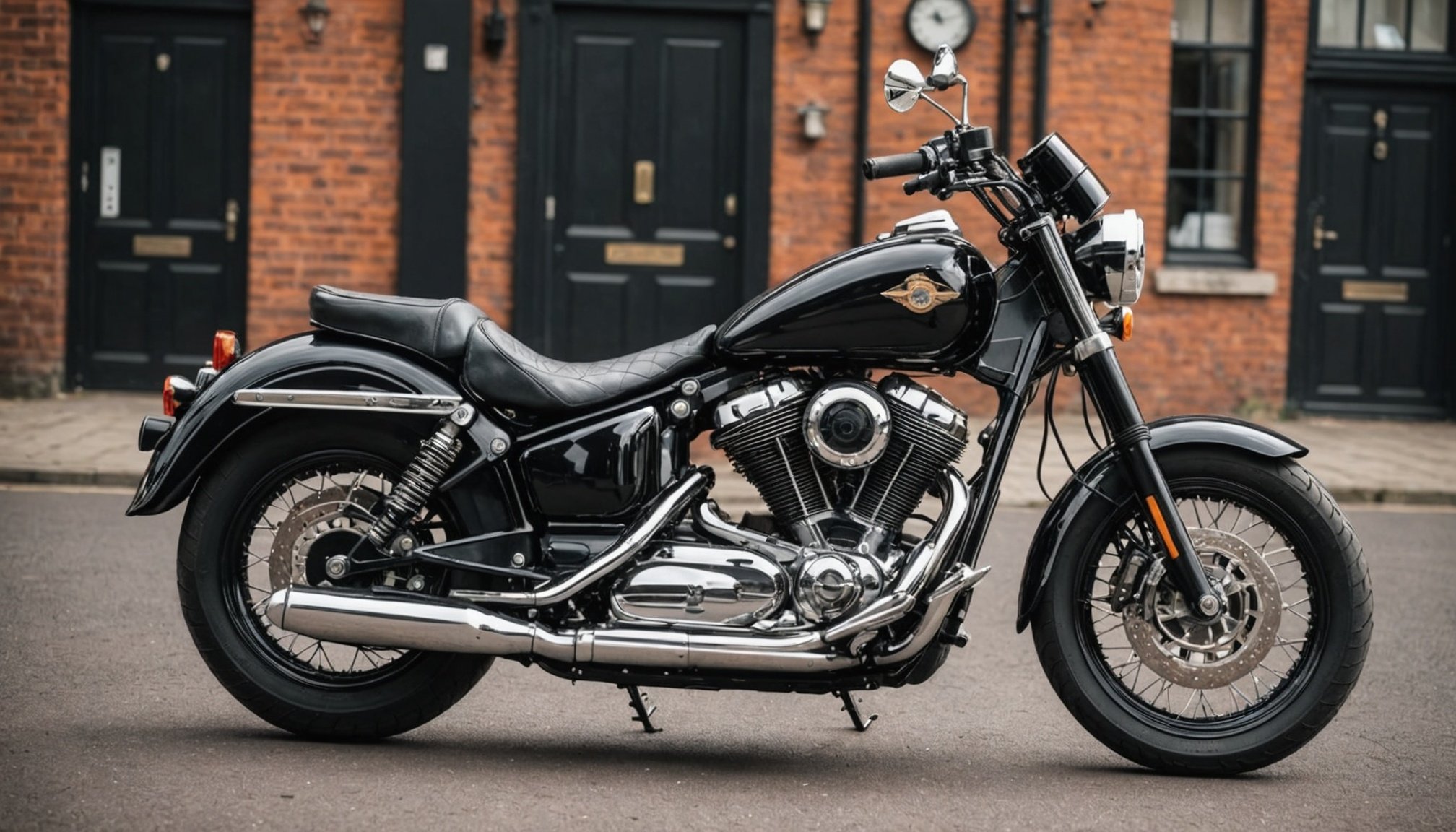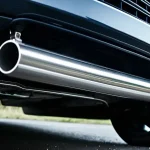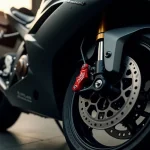Step-by-Step Overview of the Custom Motorcycle Registration Process in the UK
Registering a custom motorcycle in the UK requires a structured approach to ensure legal compliance. The process starts by gathering all necessary documentation, including proof of ownership and detailed specifications of the bike. This helps to register your custom bike accurately with the Driver and Vehicle Licensing Agency (DVLA).
Next, you must complete the appropriate application form. For custom motorcycles, the main form used is V55/5, specifically designed for vehicles built or rebuilt. Alongside the form, submit a detailed description and photographs of the bike, highlighting its unique features. This is crucial for verifying the authenticity of your custom build.
In parallel : Navigating UK Noise Laws: Essential Guidelines for Vehicle Lovers Enhancing Exhaust Systems
Following submission, your application undergoes a compliance check. This involves inspections to certify that the motorcycle meets safety and environmental standards. Once the DVLA is satisfied, you will receive a registration number and certificate of roadworthiness.
To track your custom motorcycle registration UK application, use the DVLA online tracking service. This step-by-step guide simplifies the journey, making it easier to monitor progress and address any queries promptly. By following these streamlined steps, you can efficiently complete the registration without unnecessary delays.
This might interest you : Convert your van into a legit uk camper: your ultimate step-by-step guide to an exciting journey
Essential Documents Required for Registration
Understanding the paperwork is key to smooth motorcycle registration
Registering a motorcycle in the UK mandates precise documents for motorcycle registration to avoid delays. The V55/5 form is fundamental for registering used bikes and signifies ownership intent. Alongside this, presenting proof of ownership is vital; accepted documents include a bill of sale, the original V5C registration certificate, or a valid vehicle purchase invoice.
Identity verification UK standards require drivers to submit documents like a valid passport or UK driver’s licence. This ensures the registrant’s identity matches the vehicle documentation, reinforcing legal ownership.
If your motorcycle is home-built or uniquely modified, additional proof of build might be necessary, often involving engineering certificates or manufacturer documentation.
To organise documents efficiently, compile all forms and proof in a single folder. Double-check that the V55/5 form is correctly completed with accurate details. Ensure all identity documents are current and legible. When submitting, consider using tracked delivery or applying online where possible for convenience and traceability. This thoughtful preparation reduces processing time and increases approval chances.
Legal Considerations and Compliance for Custom Motorcycles
Understanding the essentials to keep your custom bike road-legal
When building a custom motorcycle, it’s crucial to navigate the maze of legal requirements custom bike owners face, particularly in the UK. One of the most important aspects is passing the MSVA test—a mandatory inspection that confirms your modified bike meets safety and environmental standards. Without this approval, your custom build cannot be registered legally, which can cause frustrating delays.
UK motorcycle regulations emphasize not only construction quality but also adherence to safety elements, such as lighting, brakes, and noise limits. Modifications that stray too far from the original design or compromise safety risk rejection during inspection. Therefore, understanding legal requirements custom bike owners must fulfill ensures smoother registration.
To avoid setbacks, it’s advisable to thoroughly prepare your custom build to meet the MSVA test criteria. This includes detailed documentation and ensuring each altered component complies with the regulatory framework. Staying informed about UK motorcycle regulations for modified bikes protects you from non-compliance penalties and supports a hassle-free transition from workshop to road.
By focusing on these critical legal aspects, custom motorcycle builders can confidently bring their unique creations to the streets with full confidence in compliance.
Registration Fees and Associated Costs
When registering a motorcycle in the UK, understanding the motorcycle registration cost UK is essential to avoid surprises. The primary fee is the DVLA vehicle registration fee, which typically covers the initial registration document and license plates. This fee varies slightly depending on the bike’s age and type. For custom bike expenses, additional testing may be required, such as an individual vehicle approval (IVA), which incurs further costs to ensure safety and compliance with regulations.
Besides DVLA fees, expect administrative charges, including processing fees if handled through third-party agents. It’s important to remember that emissions testing or roadworthiness inspections can add to your overall expenses.
Payment methods accepted usually include card payments online or at DVLA offices. Always request and retain receipts to keep a record of your transactions, as proof of payment might be necessary for future inquiries or updates. Keeping track of these fees ensures clarity in managing your motorcycle registration cost UK, especially if dealing with complex situations like custom bike expenses or specific registrations. Understanding these costs upfront saves time and avoids unexpected financial strain during the registration process.
Registration Timelines and Processing Expectations
Understanding the motorcycle registration timeline UK is essential to avoid surprises after submitting your application. Typically, the application processing by the DVLA follows a sequence starting with document verification, followed by assignment of the registration number, and ending with dispatch of plates and documents. On average, expect a turnaround time of around 4 to 6 weeks for complete processing under normal circumstances.
Several factors can affect these timelines, including incomplete or incorrect application forms, missing documents, or high demand periods. For example, applications during peak seasons or when special number plates are requested may experience longer delays. Additionally, any issues flagged during vehicle inspection can significantly extend the waiting period.
To expedite your application, ensure all submitted details are accurate and comprehensive. Utilizing online application methods can shorten processing times compared to postal submissions. Where urgency is critical, contacting DVLA directly to confirm receipt and status may help identify and resolve bottlenecks quickly. Being proactive can save considerable time within the overall motorcycle registration timeline UK, allowing riders to enjoy their vehicles without avoidable delay.
Common Pitfalls and Practical Tips for a Smooth Registration
Navigating custom bike registration in the UK can be tricky, but avoiding common mistakes ensures a smoother process. One frequent error is submitting incomplete or incorrect paperwork. Always double-check that your documents match the details on your bike, especially the Vehicle Identification Number (VIN). This simple step helps avoid registration issues UK applicants often face.
Another common DIY motorcycle mistake is neglecting to obtain the necessary Vehicle Approval Certificate (often the IVA or Single Vehicle Approval). Without this, your registration won’t proceed. Keeping copies of all test certificates and receipts handy streamlines the application.
For hassle-free processing, carefully fill out forms such as the V55/5 or V55/4. Errors in filling these increases delay risk. Confirm that your address and personal details are up to date before submission.
Applicants should prepare a checklist that includes:
- VIN and engine number verification
- Valid insurance confirmation
- Completed and accurate registration forms
By following these custom bike registration tips, you can prevent common pitfalls and ensure your motorcycle is road-legal without unnecessary delays or frustrations.
Updated Regulations and Recent Changes Affecting Custom Motorcycles
Understanding the newest rules and keeping your ride street legal
In 2024, the motorcycle regulations update in the UK introduces significant changes that impact both builders and riders of custom motorcycles. Notably, the DVLA has refined its requirements, including stricter documentation and vehicle modifications disclosures. These updates aim to enhance road safety and streamline vehicle registration processes.
For custom motorcycle owners, this means any alterations from the base model must now meet specific standards concerning emissions, noise levels, and safety equipment. Failure to adhere to these could result in failing the MOT or complications during registration. The updated regulations also clarify definitions related to bespoke builds, helping DVLA agents assess applications more consistently.
To stay compliant, riders should meticulously document modifications and ensure that custom parts conform to established guidelines. Consulting the official DVLA resources before registering or re-registering a custom motorcycle is prudent. Additionally, periodic checks of regulatory bulletins ensure ongoing awareness of any emerging requirements.
Awareness of these custom motorcycle law changes is essential for enthusiasts wishing to maintain legality and avoid fines or legal issues, making proactive compliance vital in the current regulatory landscape.
Trusted Resources and Expert Contacts for Registration Support
Navigating UK motorcycle registration resources can be much easier with the right contacts. For official queries, the DVLA contact centre remains the primary trusted source. They offer detailed guidance on registration requirements, paperwork, and deadlines. Calling or emailing them directly ensures you receive the most current and precise information tailored to your case.
When your situation involves complexities—such as importing a bike or dealing with lost documents—it’s wise to seek industry experts. Many specialists offer services focused exclusively on motorcycle registration to help you avoid delays or errors. They are familiar with DVLA procedures and can manage paperwork efficiently.
Community support is equally valuable. Owner clubs and online forums provide real-world insights and practical tips shared by experienced riders. Engaging with these groups often uncovers unofficial advice that complements official guidelines. Additionally, some forums link members to legal advice if disputes or compliance issues arise.
For reliable assistance, combining direct contact with the DVLA, consulting specialists, and participating in owner networks ensures thorough support throughout your registration journey.
Frequently Asked Questions (FAQs) about Custom Motorcycle Registration
Let’s address some of the most common motorcycle registration FAQ UK enthusiasts encounter when registering custom bikes. Clarity here helps you avoid delays and legal hiccups.
One frequent question is: What documents are required for custom motorcycle registration? At a minimum, you’ll need proof of identity, proof of ownership, and a vehicle approval certificate, especially if your bike is a one-off build. This ensures the vehicle matches safety and emissions standards.
Another popular query involves the timeline: How long does the process take? Expect 4-6 weeks, but delays may occur if additional inspections or paperwork are necessary. Staying proactive and submitting complete documentation can speed this up.
People also ask about costs and fees for custom motorcycles. Registration fees vary depending on your bike’s type and age, but factor in V5C form application fees and possibly MOT testing charges. Knowledge of these expenses beforehand helps you budget effectively.
Finally, a common misunderstanding concerns insurance: you must have valid insurance before your custom motorcycle can legally hit the road. This often surprises first-time owners but is crucial for compliance and protection.
These expert answers make the registration process simpler and help you get your custom bike road-ready with confidence.




